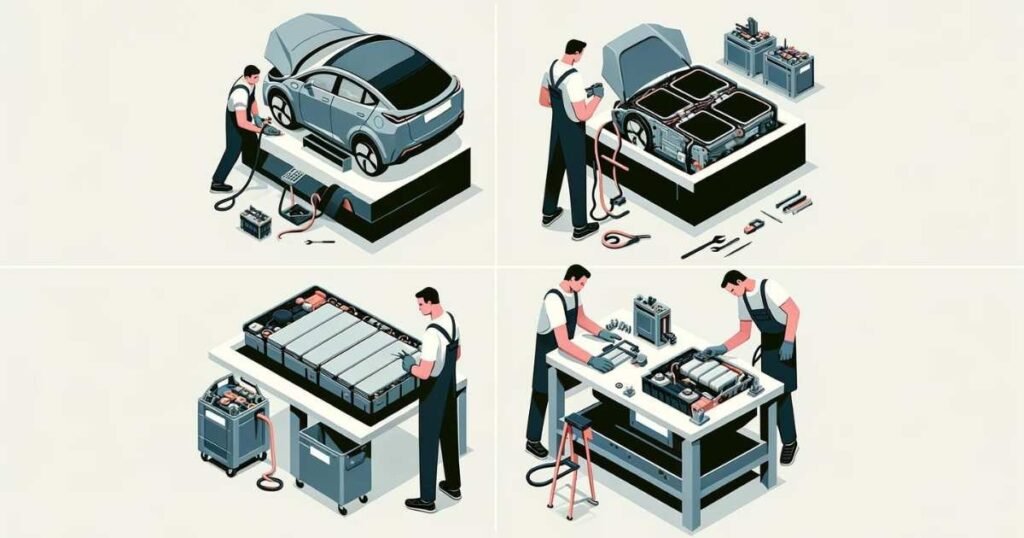Electric vehicles, also known as EVs, are becoming increasingly popular. People like them because they help the environment and work well. However, EVs are different from gasoline cars, especially when it comes to caring for them. Even though they seem tricky, EVs don’t need as much maintenance as regular cars. This is good because you can save time and money using them.
I’ve spent many years working on all sorts of vehicles, and the move to electric cars is exciting! These cars are quiet and speed up smoothly, which many people like. But, some drivers are curious about how to care for these cars. They wonder if there’s anything special they need to do since there’s no oil to change or spark plugs to replace.
Let’s clarify some things about taking care of EVs. While they don’t need as much maintenance overall, there are still some essential things you should do. This helps keep your electric car happy and running well on the road.
Table of Contents
Why is Electric Vehicle Maintenance Important?
Taking good care of your car is essential, and this is especially true for electric vehicles. Proper care helps the battery and other parts last longer, which is great because it means you won’t have to spend as much money fixing or replacing things later.
Also, your electric car works its best when you do regular maintenance. It can go farther on a single charge and performs well. This means you get the most out of your vehicle every time.
Why is Electric Vehicle Maintenance Different?
One of the big perks of owning an electric vehicle (EV) is that you don’t have to do as much routine maintenance. Electric cars are different from gasoline cars because they have fewer moving parts. This means fewer things in the car need regular checking and fixing.
With an electric vehicle (EV), you can say goodbye to oil changes and tune-ups and deal with engine, transmission, and exhaust system services. EVs also have a cool feature called regenerative braking. This uses the electric motor to slow the car and grab some energy back. It’s a neat trick that means less wear and tear on the regular brakes.
Gasoline cars need a lot of routine maintenance to keep running well. They need oil changes, new filters, and tune-ups often. But with electric vehicles, you don’t have to worry about most of these things. Since EVs have fewer parts that move, they need less maintenance, which helps you save money over time.
What Maintenance Does an Electric Car Need?
Electric vehicles (EVs) are lower maintenance compared to gasoline cars, but they still have specific areas that need regular attention:
1. Battery Care—For optimal performance, it’s essential to check your EV’s battery every 1-2 years. Extreme temperatures can affect the battery, so park in moderate climates.
- Charging Habits – Frequent use of fast chargers can harm your battery over time. For daily use, slower Level 1 or Level 2 charging is better. Also, it’s good to keep the battery charge between 85% and 90% rather than fully charging or depleting it.
2. Regenerative Braking—This feature reduces wear on traditional brakes, but the brakes and the regenerative braking system need periodic checks to ensure they work correctly.
3. Cabin Air Filter—Your owner’s manual recommends regular cabin air filter replacement to keep the air inside your EV clean.
4. Tire Care—Due to the additional weight of EVs from the battery pack, maintaining proper tire pressure and regular rotations is vital for tire longevity and energy efficiency.
5. Software Updates—EVs rely on software for various functions, including battery management. Regular updates can improve performance and add new features.
6. Wiper Blades and Fluids—Wiper blades should be replaced periodically for safety. While oil changes aren’t necessary, some EVs may require coolant changes for the battery, and brake fluid replacements might be needed less frequently than in traditional cars.
7. Powertrain and Coolant System—The electric motor and transmission may need fluid changes depending on your vehicle’s specific maintenance schedule. The coolant system also requires periodic maintenance to keep the battery and motor at optimal temperatures.

Taking care of your electric vehicle (EV) is essential. To know exactly what to do and when you should look at the owner’s manual that came with your EV. This book has a unique schedule made by the people who made your car. It tells you when to check different vehicle parts, where to oil, and when to update the software. Following this schedule is critical to keeping your car running great. It’s like a plan to make sure your EV always works its best!
What are the Warning Signs Your EV Needs Attention?
Electric vehicles (EVs) need less maintenance, but paying attention to their actions is still important. Here are some signs that you might need to take your EV to a service center:
If your EV isn’t going as far on a single charge as it used to, this could mean there’s a problem with the battery, or the car could be more efficient.
EVs are quiet. So, if you hear strange noises like grinding, whining, or clunking, you should get them checked out immediately.
For example, your EV’s dashboard lights turn on in gasoline cars for different reasons. If any of these lights come on, don’t ignore them! Look in your owner’s manual to see what they mean, or take your car to a service center to figure out the problem.
If your car takes longer to charge than usual or you need help connecting to charging stations, there might be something wrong with your charging system. This is another sign that it’s time for a professional to look at your EV.
What is EV Maintenance vs. Gas-Powered Cars? Key Differences
Electric vehicles (EVs) and gas-powered cars both need to be taken care of, but there are some significant differences between them:
EVs only need a limited number of maintenance procedures compared to gas cars. For example, you don’t have to change the oil or replace spark plugs in an EV because it doesn’t have the same engine as a gas car.
The most important thing to look after in an EV is the battery. Keeping the battery healthy is a big part of caring for your electric car. This includes managing the battery’s temperature and being smart about how and when you charge it.
How often does an Electric Car Need to be Serviced?
How often you need to take your electric car for a check-up can change based on your car type. But, most of the time, car makers say you should have a general maintenance check every 12 months or after driving 10,000 miles, whichever happens first.
It’s a good idea to look in your EV’s owner’s manual. This book will tell you exactly when your car needs to be checked, depending on its make and model.
How Much Electric Vehicle Maintenance Cost?
Let’s explore how taking care of electric vehicles (EVs) is different from gasoline cars:
EVs usually cost less to maintain than gasoline cars. Over the life of an EV, you could save anywhere from $330 to $4,600 compared to a gas car. This means that while enjoying your quiet EV and helping the environment, you might save money!
Consumer Reports in 2020 reported that EV owners could save about $4,600 on average in repairs and maintenance over their car’s life compared to gas-powered vehicles. This is because EVs have fewer moving parts. Oil changes, transmission maintenance, or exhaust system repairs are unnecessary. Also, EVs have regenerative braking, which means brake pads have less wear. They don’t need regular tune-ups or emissions checks either. Another bonus is that charging an EV with electricity often costs less than filling up a gas car.
In 2022, Car and Driver compared the costs of owning EVs to gasoline cars. They looked at vehicles like the Hyundai Kona and Kona Electric and the Ford F-150 and F-150 Lightning over three years. They found that even if EVs cost more initially, you can save money later because of lower maintenance and fuel costs.

Still, EVs do have some costs. The cost of charging your EV will vary based on your electricity rates, and it’s generally cheaper to charge at home than at public stations. EV batteries last a long time, but they’ll eventually need replacing. The price for this can vary, but battery costs are decreasing. EVs might need unexpected repairs sometimes, but this is less common than with gasoline cars because EVs have fewer parts that can break.
In the end, EVs often turn out to be more budget-friendly than gasoline cars in terms of maintenance and overall costs!
Is Electric Car Maintenance Expensive?
Taking care of an electric car usually costs less than a gasoline car. This is because electric vehicles have fewer parts and fluids that need replacing. But one thing to remember is that replacing the battery in an electric car can be costly. The good news is that the battery is usually covered under warranty. Plus, these batteries are made to last for many years, so you will only need to replace them sometimes.
Where Can I Get the EV Car Maintenance Services?
Electric vehicles (EVs) might need less maintenance than gasoline cars, but you still have to take good care of them. Here are the different places you can go for service:
Dealership Service Centers: These places have technicians who are good at working on your specific type of EV. They use parts made just for your car and special tools to diagnose what’s wrong.
Independent Repair Shops: These shops often have reasonable prices, and some people know much about EVs. They have qualified people who understand how to take care of your EV.
National Service Chains: You can find these everywhere and might not have to wait as long. But, the technicians there might need to learn a lot about EVs, especially for tricky repairs.
When choosing where to go, do some research:
- Research: Look for shops with people who know a lot about your type of EV. Reading online reviews and asking other EV owners can help.
- Experience: Ask the shop how much they’ve worked on EVs and what kinds of services they offer.
- Compare Prices: Check out prices from dealerships and independent shops before deciding.
Here’s a bonus tip: Some car makers can update your EV’s software remotely. This can improve the battery’s performance or fix problems. Keeping your software up to date is an easy way to make your EV work its best!
Final Thoughts
Electric cars are unique because they are simple to maintain. Unlike traditional vehicles, which require complex work, keeping an electric vehicle (EV) is easier. You must do regular checks, update the software, and pay attention to warning signs. Doing these things will help your EV work well for many years.
As EV technology improves, taking care of them will become even more accessible. Imagine a future where cars can check themselves and get software fixes from far away. The way we maintain cars is about to change significantly, and electric vehicles are leading this change. So, get ready for a quiet and easy ride with your electric vehicle!
Relevant:
Do Teslas Need Oil Changes? No, Learn Why?
Do Electric Vehicles Need Oil Changes?
What Maintenance Does a Car Need?
How Do I Know If I Need an Oil Change?
FAQs
How long do EV batteries last?
Electric vehicle (EV) batteries can last a long time, usually about 12 to 15 years. How long they last can depend on how you use them and the kind of weather they’re in. Charging them correctly and keeping them away from hot or cold temperatures can make your battery last even longer!
Can I perform any EV maintenance myself?
Yes, you can do some basic maintenance tasks for your electric vehicle (EV) at home. Things like topping up fluids and doing visual checks are okay to do by yourself. But, if you need to update the software or change the brake fluid, it’s better to go to a certified technician.
How often do I need to get my electric car serviced?
Electric cars don’t need to be serviced as often as gasoline cars. Check your owner’s manual to determine when your vehicle needs to be checked. Usually, it includes checks every 30 days, tire rotations, inspections every 7,500 miles, and more detailed checks at certain times.
What is the most expensive part to maintain on an electric car?
The battery pack is the costliest part to replace in an EV. Luckily, these batteries often come with extended warranties, and thanks to new technology, they’re getting better and lasting longer.
Are electric cars expensive to maintain?
No, EVs usually cost much less to maintain than gasoline cars. No oil changes are needed, fewer parts can wear out, and the regenerative braking system means you won’t need to replace brake pads as often.
What is the lifespan of an electric car?
The battery in an EV can last a long time, like 10 to 20 years or 150,000 to 300,000 miles. How long it lasts depends on how you use and care for it. If you maintain the car properly, the rest can last as long as a gasoline car.
What maintenance is required for electric cars?
Even though EVs need less care than gasoline cars, they still need attention. Here’s what to focus on:
- Battery Care—Check the battery every 1-2 years. Extreme temperatures can affect the battery, so park in places that aren’t too hot or cold.
- Regenerative Braking System—This system helps save the battery but must be checked regularly.
- Cabin Air Filter—Like gasoline cars, you must replace this filter often (check your manual for when).
- Tire Care—Since EVs are heavier, ensure your tires are adequately inflated and regularly rotated.
- Software Updates—Updating the software is key to achieving the best performance (these updates are often free).
What does an electric car need for a service?
A typical service for an EV might include:
- Looking at brakes, suspension, and the chassis.
- Checking fluid levels for the battery and cabin heater.
- Replacing the cabin air filter (check your manual for when).
- Getting software updates from the manufacturer (usually free).


